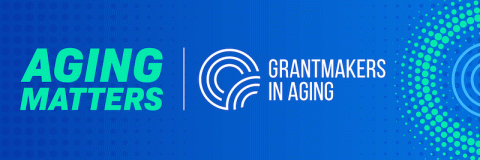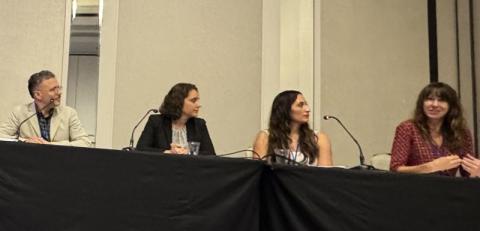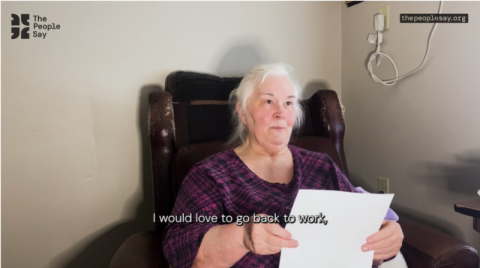
A Message from Lindsay Goldman
Read the full June/July 2025 edition of Aging Matters
This is not the kind of history we want to make.
This week, the Senate and the House passed the “Big Beautiful Bill Act,” bringing us all one step closer to the largest Medicaid cuts of all time. We now have a pretty good idea of what’s in store for older people, caregivers, people with disabilities, low-income people, and others, and it’s bleak.
What now?
Philanthropy and politics often have very different goals, but two things in common. First, data and facts matter in shaping policy and funding decisions. Second, those decisions directly affect the lives of real people, sometimes profoundly.
I’ve been thinking about how we map a way forward, and doing it in excellent company, most recently at the Grantmakers In Health (GIH) conference, where GIA co-sponsored a learning lab titled Advocating for Aging Adults in Uncertain Times.

The message was that philanthropy must support more than program-based work and service. We can – and should – also help pursue policy reform. And that means education and advocacy.
Two key thoughts also emerged. There are multiple important audiences for our advocacy, not just Congress; and we can increase our influence by strengthening and expanding our coalitions.
Specifically, we can advocate (and fund advocacy by nonprofit partners) for Medicaid policy at the state - not just the federal - level. We can educate (and fund education of) all elected officials, remembering to include those that already agree with us. We can raise public awareness of the benefits we all rely on from critical programs like the Older Americans Act, Medicaid, Medicare, and Social Security, and the need to protect those programs.
We can help nurture and grow coalitions. For aging philanthropy, this can mean more deliberately making common cause with the disability community, supporting local advocacy groups, and activating our networks.
Finally, both we and our grantee partners must build our communications and advocacy muscles, using stories to humanize abstract policy decisions and integrating older adult leaders as spokespeople and influencers.
The People Say

If you want to feel the power of a real person talking about being rejected from Medicaid for having life insurance, or not being able to go back to work (and therefore being unable to meet the proposed Medicaid work requirements) because they can’t afford to fix the brakes on their car, or having an empty refrigerator, I recommend Voices of the Forgotten Middle. It’s part of a larger project, ThePeopleSay.org, from the Public Policy Lab and The SCAN Foundation, with more than 100 hours of interviews with older adults talking about their lives and the policy issues most important to them.
One other GIH panel I can’t stop thinking about reflected on this year’s 60th anniversary of Medicare, Medicaid, and the Older Americans Act. While encouraging funders to protect existing services, panelist Tricia Neuman, Senior Vice President and Executive Director for Program on Medicare Policy at KFF, also added this:
“Don't be paralyzed by the moment. There is so much we can do. It is a time to envision what could be better.”
Data you won’t forget
Speaking of KFF, Tricia and other KFF analysts have created three extremely timely data-rich analyses of the impending Medicaid and SNAP food aid cuts. This work was supported in part by The John A. Hartford Foundation. They found that:
- New obstacles could slow or block 1.3 million Medicare beneficiaries from enrolling in Medicaid’s Medicare Savings Program, which helps low-income people afford their premiums.
- Impact on older adults includes cuts to long-term care services and taking Medicare away from current beneficiaries who are not US citizens, such as green card holders and lawful immigrants.
- The proposed $287 billion cuts to SNAP would affect 9 million older adults and people with disabilities on Medicare, among others.
So, more older people will be sick and hungry with less access to nutritious food and healthcare. The data does not support the claim that these cuts will save money.
(Sickness + hunger) – (prevention + treatment) = More sickness
More sickness = higher healthcare costs
Grassroots and mountaintops
A new state-based advocacy venture being launched by Next50 will focus its work within Colorado. Next50 says the still-unnamed nonprofit will be independent of the foundation and will, “tackle one of the most pressing issues of our time: economic insecurity among older adults.” They’re looking for their first President/CEO (application here) and are also seeking founding Board members – explore that opportunity here.
With everything that is happening, it’s easy - and understandable - to feel discouraged. But let’s not get stuck there. Those of us in philanthropy have an opportunity to make a difference in a time of unmatched need. Our nonprofit partners need support. Older people need to be advocates. We all have to live with the history that’s being written in Washington right now. Let’s make sure the next chapter is a much more just and equitable one.